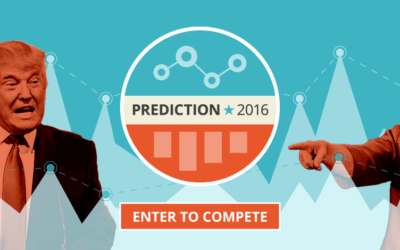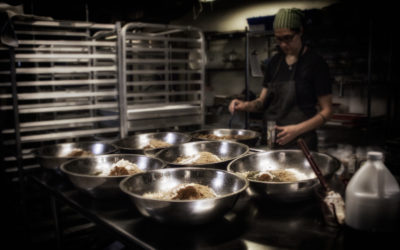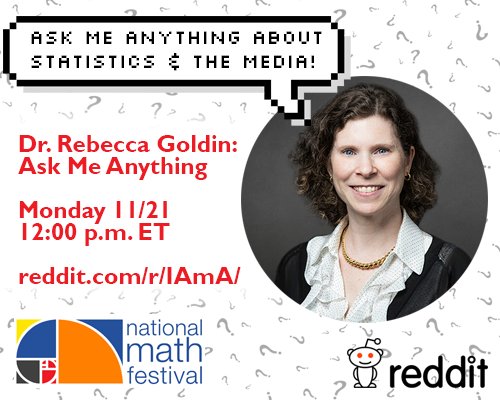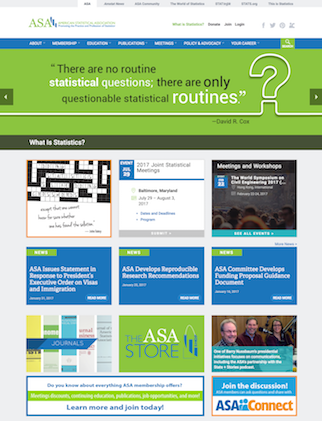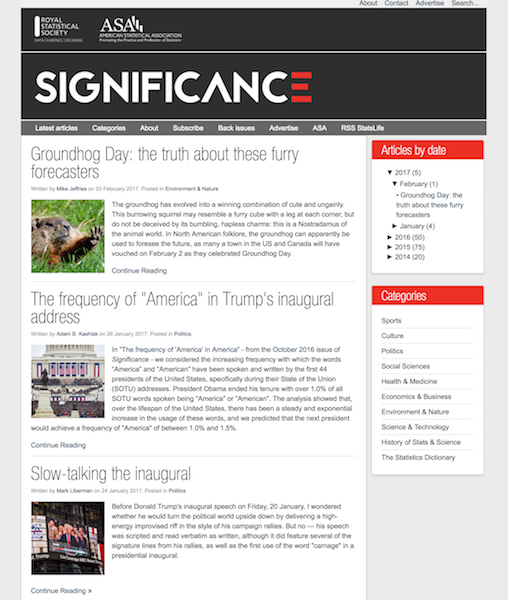
STATS is our collaborative project with the American Statistical Association to improve statistical literacy among journalists, academic journal editors, and researchers.
“The ASA-SAS USA partnership on STATS has set its sights squarely on the target of developing a statistical literate citizenry, and is quite likely the most important development in the American Statistical Association’s long efforts to promote statistical literacy.”

New on STATS
 STATScheck
STATScheck
Are you a journalist? Our volunteer advisory board of academics from across the U.S.
are here to help you make sense of statistics and numbers. We’ll do our best to help you make your deadline.
Business Insider
Dallas Morning News
Five Thirty Eight
Forbes
Fortune
Fusion
Gatehouse Media
Health News Review
Huffington Post
KOMOTV
L.A. Times
Las Vegas Review Journal
Medpage Today
National Geographic
National Press Foundation
National Public Radio
New York Times
News Tribune
NPR
PBS NewsHour
Press Democrat
ProPublica
Quartz
Reuters
STAT News
Vox
Wall Street Journal
Washington Post
Worcester Business Journal
WUSA9
 STATS Workshops
STATS Workshops
Free interactive workshops in statistics tailored to science, health, and general reporting. We’ll come to your newsroom, journalism school or media organization.
 Promoting Statistical Literacy
Promoting Statistical Literacy
Sense About Science USA promotes statistical literacy at academic and public events across the U.S.
 Scientifically Speaking (STATS edition)
Scientifically Speaking (STATS edition)
We also work with statisticians and statistics students to improve the public’s understanding of statistics through better communication.
 STATS Forum
STATS Forum
A venue for statisticians and mathematicians to critically evaluate study design and statistical methods in research. The subjects (products, procedures, treatments, etc.) of the studies being evaluated are neither endorsed nor rejected by Sense About Science USA. We encourage readers to use these articles as a starting point to discuss better study design and statistical analysis. While we strive for factual accuracy in these posts, they should be considered academic rather than journalistic writing.
What the 2016 Presidential Election taught us about polling, predictions
What are the lessons we should learn about data journalism and polling from the mismatch between prediction and outcome in the 2016 Presidential Election? STATS.org advisory board members weigh in.
What do we mean by “reproducibility”?
Amid a growing concern about research reliability, funders have called for a greater effort to make research reproducible. The call is admirable, but the discussion is often confusing, since “reproducibility,” “replication,” and related terms are used in many different ways across, and even within, scientific disciplines. So, what do we mean when we say “reproducibility”?
Suspicious supervisors and suspect surveys
Public opinion polls are ubiquitous in rich countries, especially during elections. The classical ideal for building polling samples is that they should be random, and are likely to resemble microcosms of the general population up to a margin of error. In practice, real samples deviate considerably from this random ideal. But even real surveys have patterns, and when these patterns are violated, we might suspect fraud.
David Spiegelhalter, Winton Professor for the Public Understanding of Risk at the University of Cambridge talks about what makes statisticians miserable and why it’s important for society.
Sense About Science Executive Director Trevor Butterworth talks about the importance of statistical literacy for journalists on Montreal’s The Body of Evidence.
Reddit AMA with STATS Director Rebecca Goldin. Click here.
 Partners and Resources
Partners and Resources
Our partners, major statistical organizations, books, articles, and blogs.

